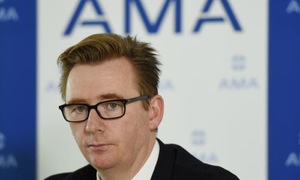
Doctors’ groups have vowed to take a “zero tolerance” approach to sexual harassment within the profession, after explosive comments by a top-ranking female surgeon thrust the issue into the spotlight.
Vascular surgeon Gabrielle McMullin said last month women in the profession would progress further in their careers if they complied with unwanted sexual advances instead of reporting them. The comments, which drew a barrage of criticism, were made at the launch of her book on gender equality.
McMullin’s comments, which she said were meant to stress that reporting sexual harassment was fraught with difficulty, have prompted serious soul-searching by the medical fraternity.
Just before Easter, representatives from more than two dozen medical groups converged on Canberra to discuss how to stamp out harassment. The sex discrimination commissioner, Elizabeth Broderick, and representatives of the NSW government also attended.
The Australian Medical Association (AMA) has distributed a survey to its members to gauge the prevalence of the problem. AMA president Brian Owler said he did not think sexual harassment of doctors by colleagues was rife.
“It’s confronting for all of us. It’s a topic that sits uncomfortably for all of us,” he said. “But if there’s an issue at all, we have to deal with it.”
He admitted that some medical professionals had not recognised that behaviour in the workplace had changed.
“We’ve got to look at the culture and behaviours and attitudes [within the profession],” Owler said.
One in four women contacted for a Human Rights Commission survey in 2012 reported they had been sexually harassed at work in the previous five years.
The president of the Royal Australasian College of Surgeons, Michael Grigg, said his organisation had “zero tolerance” for sexual harassment.
“Even one case is too many,” he said.
The college has set up an expert panel to study the issue, including the former Queensland health minister Rob Knowles, the former Victorian police commissioner Ken Lay, the head of Oxfam Australia, Helen Szoke, and the former New Zealand judge Judith Potter.
The group met for the first time at the end of March, and is expected to submit its preliminary report within three months.
“The quality of the report will have implications beyond the college to the wider profession,” Grigg said.
The report is expected to look at how to make victims of sexual harassment feel safe in reporting incidents, a process both Owler and Griggs admit needs strengthening.
“People who experience sexual harassment rarely report it. So whilst formal policies and procedures are important, the hidden nature of this issue often means that these policies are not utilised by the targets of harassment,” Broderick said.
“Unwelcome sexual behaviour at work is against the law. Employers have a legislative obligation to provide safe and equitable workplaces that are free from harassment. Workplaces should take a zero-tolerance approach to workplace sexual harassment,” she said.
